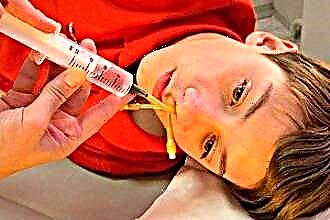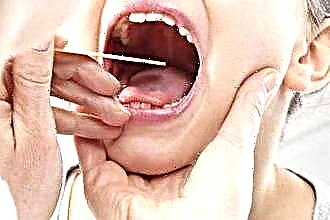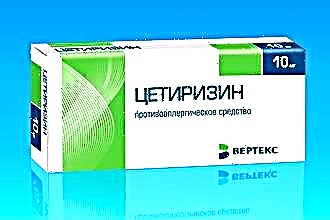Dr. Komarovsky is today one of the most reputable Russian pediatricians, whose opinion is trusted by most mothers and grandmothers. He is often approached with simple and tricky questions about the health and development of children. And one of the most popular "parenting" questions is why a child periodically bleeds through his nose and what to do about it.
External causes
An important principle of work for Dr. Komarovsky (it's a pity that not for all our doctors!) Is to treat not the symptom, but the cause. Moreover, nosebleeds, even severe ones, are not a disease in themselves. They are necessarily caused by other malfunctions in the body or the negative effects of external stimuli.
 Komarovsky suggests starting to look for the causes that caused the child's nosebleeds just from external negative factors, since it is easiest to detect and eliminate them.
Komarovsky suggests starting to look for the causes that caused the child's nosebleeds just from external negative factors, since it is easiest to detect and eliminate them.
- Dry air in the room. The most common cause of mild nosebleeds. Due to the drying out of the mucous membranes in the nose, crusts are formed, which the baby tries to reach with his finger, tears off the surface of the mucous membrane, scratching it or injuring the capillaries.
- Improper care. Mom can also injure the delicate children's mucous membrane, especially if she uses cotton swabs to cleanse her nose. Even if the cotton wool remains in place, and not in the nose (which also happens quite often!), You can simply not calculate the force of pressure and damage the mucous membrane.
- Heatstroke. The baby may simply overheat in the sun or the mother may overdo it with its "insulation" in the cold season. In this case, a strong expansion of the capillaries leads to their rupture and nosebleeds, sometimes quite profuse.
- Constant irritation of the mucous membranes, allergies. Under the influence of external stimuli, the nasal mucous membranes become inflamed, become friable, very sensitive, and easily injured. Even a microtrauma can lead to the fact that the nose will bleed.
- Medications. These are not only vasoconstrictor drops, but also most antihistamines, some antiviral complexes (such as Coldrex and Gripex). All of them significantly reduce mucus production. This helps to get rid of a runny nose and at the same time dries out the mucous membranes.
As soon as the influence of external stimuli is eliminated, nosebleeds stop and do not reappear. If this did not happen, it is necessary to approach the issue more seriously and look for internal reasons.
Internal reasons
It is impossible to list all the internal reasons that can lead to the fact that a child's nose often bleeds. The child's body is so individual that you will have to look for them in each specific case. We can only cite as an example several groups into which the internal reasons are conditionally divided:
 Overwork, lack of sleep. A child's defense mechanisms work differently from an adult. Children quickly get tired of vigorous activity. The kid can feel great, enthusiastic and play for a long time, and then suddenly become capricious. With severe fatigue, sudden jumps in blood pressure are possible, which provoke nosebleeds.
Overwork, lack of sleep. A child's defense mechanisms work differently from an adult. Children quickly get tired of vigorous activity. The kid can feel great, enthusiastic and play for a long time, and then suddenly become capricious. With severe fatigue, sudden jumps in blood pressure are possible, which provoke nosebleeds.- SARS, acute respiratory infections, colds, allergies - all diseases that cause severe, prolonged or chronic runny nose and swelling of the nasal mucosa. They lead to their loosening and inflammation, and with frequent coughing or sneezing - also overstrain of the capillaries, which simply burst.
- Blood clotting disorders. This is not necessarily a hereditary disease - hemophilia. Just it is quite rare. The use of certain medications, hormonal disorders, large amounts of vitamin C, and even excessive consumption of some herbal teas can lead to blood thinning. And it manifests itself with frequent and long-lasting bruises, the formation of subcutaneous hematomas, even with minor bruises.
- Chronic diseases of the respiratory system or other internal organs. First of all, they lead to a sharp drop in immunity, especially during an exacerbation. This means that the child is more likely to suffer from respiratory diseases, and the mucous membranes of the nose are very vulnerable. In addition, the indirect causes of nosebleeds can be: sinusitis, heart or renal failure, tuberculosis, meningitis, oncology.
Only a doctor can accurately determine the diagnosis. He will also prescribe a therapeutic course for the underlying disease and tell you what to do so that during treatment the nosebleeds less often.
Diagnostics
The first point in the scheme of the diagnostic examination Komarovsky puts blood tests: general and special, determining the number of platelets and  blood clotting rate. In addition, blood tests help to see the overall clinical picture, check for active inflammatory processes and assess the child's current state of health.
blood clotting rate. In addition, blood tests help to see the overall clinical picture, check for active inflammatory processes and assess the child's current state of health.
Then everything is individual. However, Komarovsky uses an individual approach in all cases without exception. But if the child is healthy according to the test data, it becomes necessary to consult an ENT specialist. It is he who can carefully examine the baby's nose and say that the features of the anatomical structure of the nose are not the cause of frequent nosebleeds.
For example, very often the nose begins to bleed due to the curvature of the nasal septum. It becomes the cause of drying out of the mucous membranes or stagnation of mucus in the nose. And this, in turn, provokes chronic inflammatory processes leading to atrophy and hypersensitivity of the mucous membranes, when even with an average pressure on them, blood begins to flow.
Your otolaryngologist may ask you to take an X-ray of your nose to make sure there are no polyps or purulent sinus infections. They can also provoke bleeding. And until the underlying disease is cured, the problem will not be solved. Sometimes it is even necessary to remove overgrown polyps surgically.
If no problem is found on the part of the ENT, the next on the list is consultations with an endocrinologist and additional tests, with the help of which the state of the baby's hormonal background is determined. If necessary, it can be corrected by taking appropriate medications.  But this should be done only under strict medical supervision, otherwise the consequences may be unpredictable.
But this should be done only under strict medical supervision, otherwise the consequences may be unpredictable.
When a child often bleeds during intense physical exertion, he does not tolerate them well, begins to choke, experiences chest pain, dizziness, may lose consciousness, the problem must be looked for in the heart or lungs. In this case, it is advisable to make a chest x-ray and an electrocardiogram or ultrasound of the heart and consult a pulmonologist and / or cardiologist.
Very rarely, but this also happens, it comes to the oncologist. Malignant tumors usually begin to manifest themselves long before regular nosebleeds appear.
Even at an early stage of their development, immunity drops sharply, the child begins to get sick often, loses weight, appetite disappears, weakness appears, and the skin turns pale. But these symptoms are often overlooked, attributed to whims and climate change. But the sooner a tumor is detected, the more chances of a positive outcome are.
Treatment and prevention
Dr. Komarovsky is categorically against any self-medication. The child should be treated by a pediatrician. And even if you are a supporter of the use of traditional methods, you need to do this in consultation with your doctor. Nevertheless, if nosebleeds are an isolated case, then it is enough to stop it and observe the baby. If it does not recur in the next few days, you can calm down and take the usual preventive measures:
- strengthen immunity with the help of gymnastics and hardening procedures;
- provide the baby with high-quality natural food rich in vitamins and minerals;
 twice a year (preferably in the off-season) for preventive purposes, give a course of multivitamins;
twice a year (preferably in the off-season) for preventive purposes, give a course of multivitamins;- spend at least one hour a day with the child in the fresh air (when he is healthy and weather conditions allow);
- try to remove all possible allergens and chemical irritants from the baby's room;
- make sure that it is not too hot in the child's room, maintain moderate humidity;
- treat to the end all respiratory diseases, observing the dosage of drugs prescribed by the doctor;
- not make their own decisions about prescribing antibiotics and vasoconstrictor nasal drops to a child;
- provide the baby with the opportunity to have a good night's sleep and a quiet day's rest.
These preventive measures will contribute to the overall strengthening of the child's body, and a healthy baby usually bleeds from the nose only due to an injury. But no one is immune from them. It is better to let the nose bleed from a ball hitting it than from serious chronic diseases.

 Overwork, lack of sleep. A child's defense mechanisms work differently from an adult. Children quickly get tired of vigorous activity. The kid can feel great, enthusiastic and play for a long time, and then suddenly become capricious. With severe fatigue, sudden jumps in blood pressure are possible, which provoke nosebleeds.
Overwork, lack of sleep. A child's defense mechanisms work differently from an adult. Children quickly get tired of vigorous activity. The kid can feel great, enthusiastic and play for a long time, and then suddenly become capricious. With severe fatigue, sudden jumps in blood pressure are possible, which provoke nosebleeds. twice a year (preferably in the off-season) for preventive purposes, give a course of multivitamins;
twice a year (preferably in the off-season) for preventive purposes, give a course of multivitamins;

